Written by John Edward Betancourt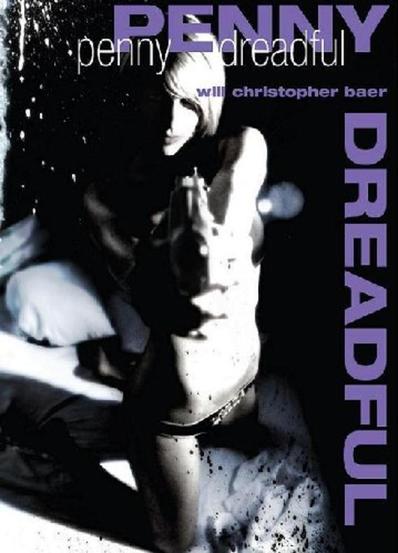 Our identity is something we hold near and dear. It truly defines us, and it is made up of so much. Our name, our mannerisms, these are all things the people in our lives come to expect and things that strangers we meet for the first time analyze. In fact, our identity is so important to all of us, we will do anything we can to maintain it and never lose it. Yet, we sometimes wonder what would happen if we were to let go of it, to be free of the confines of our identities and assume new ones where we can disappear if only for a moment when the world becomes too much to bear. But like anything in life, there are dangers that come with such an act and perhaps the darkest depths of those dangers are explored in Will Christopher Baer's second Phineas Poe novel, Penny Dreadful. Phineas Poe has returned to Denver after his adventures in Kiss Me, Judas but something seems amiss about the city, and things are only complicated further when his old friend Detective Moon comes to him for help in finding a missing police officer named Jimmy Sky. With Phineas essentially being a ghost in this town he begins the hunt for the missing man, only to find that a new and disturbing trend is gripping the city; the Game of Tongues. It is a game of bloodshed and a game where identity means nothing, and power is everything and now Phineas Poe will have to play it in order to find Detective Moon's missing man. When it comes to this series of books, what I enjoy about them the most is the sheer fact that they are so unlike any other kind of story that I own. Phineas Poe is a wonderful anti-hero and after the dreary and disturbing Kiss Me, Judas I was wondering how Will Christopher Baer would top that story and Penny Dreadful delivers a powerhouse sequel that well...entrances and disturbs you in so many ways. One such element that makes this novel so fascinating is the entire theme of identity. For those involved in the Game of Tongues must assume a new identity, and a new life in many ways and it is an incredible journey of self-discovery for the characters and it forces the reader to question every single character's motives, and that's where this book draws you in. Because it also challenges you to wonder if there is something out there powerful enough to make you shed your own identity and take on another and that makes the book damn near impossible to put down.
0 Comments
Written by John Edward Betancourt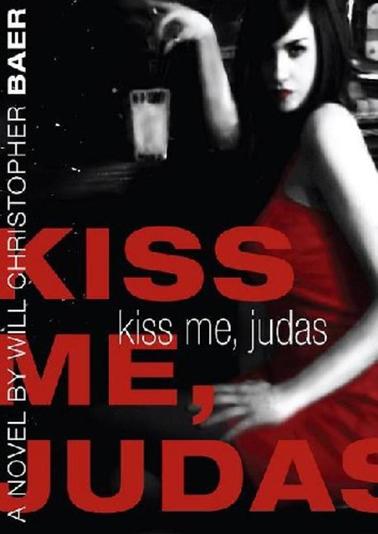 There is something utterly fascinating about urban legends. Their origins always fire up my imagination, leaving me wondering exactly how such legends came to be. In fact, I often wonder if these twisted tales actually happened to some poor soul who just so happened to have their worst moment in life forever cemented in history in the wrong kind of way. It's also good to know that I am not the only one who lets their imagination run wild in that fashion and thanks to author Will Christopher Baer, I was pulled into the world of a living urban legend, and the horrors that follow said legend in the first book in the Phineas Poe trilogy, Kiss Me, Judas. Phineas Poe awakens one morning, in complete and utter pain. There is a massive surgical wound shooting pain up his side and from the looks of the amount of ice in the bathtub that has served as his bed, and the note left by the woman he met last night, Jude, his kidney has been removed. But there is more here than simple organ theft at play and Phineas will be now plunged into a world of conspiracy and drugs as he searches for his missing organ and the woman who robbed him of it. I found this novel to be completely and utterly refreshing and fascinating. Simply because of how unique and dark this little gem is. Phineas Poe is truly thrust into the underbelly of a world we have never known, one filled with the creepiest of people and the seediest of places and I was captivated from the get go. Each character is as colorful as they can get and their odd agendas and plans for themselves make this novel a dangerous read since we never quite know who is telling the truth and if Phineas is ever truly safe. Take all of that into account and throw in a surprise ending that I know I didn't see coming and you are treated to a fantastic novel set in a modern noir world that leaves you turning page after page. I absolutely recommend this novel thanks to its unique design in storytelling and because holy crap, it is absolutely captivating. Pick it up, read it as soon as possible because this merely sets the stage for Phineas Poe's story, as since there are two sequels that follow Kiss Me, Judas and yes, they are as fantastic as this one...and oh yes, we'll talk about them soon enough. Written by John Edward Betancourt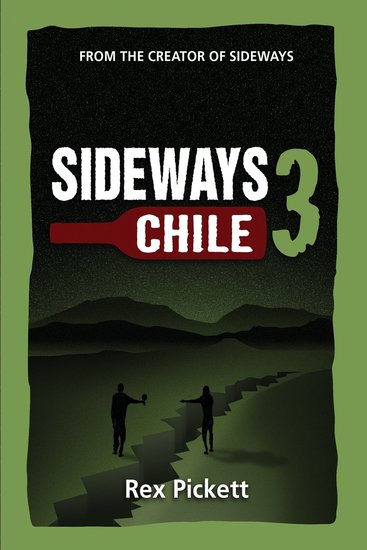 When it comes to books, there are no boundaries as to what an author can explore. They can take us to wondrous places that allow our spirits to soar, or take us on an emotional journey, the kind where a box of Kleenex is required to go with your reading experience. Or, if you're Author Rex Pickett, you can take all of that one step further and take us through a vivid slice of everyday life. Rex's work is quintessential reading when it comes to life at middle age and his Sideways series has always brought forth a raw and visceral experience when it comes to the life and times of Miles Raymond and what he goes through as he ages. In many ways, Sideways and Vertical serve as life manuals; reminding us that we will continue to make mistakes as we age, and life will still be tough, it's how we deal with all of it that matters. But despite how much fun it has been to go on these drunken journeys with Miles and Jack, all good things must come to an end and Rex has finally brought forth a finale to the series with Sideways 3 Chile. This time around we rejoin Miles several years after the events of Vertical and the years have not been kind. He's still fighting the good fight to find a new story to write that will replicate the success of Shameless, in fact he's doing everything he can just to find work as a writer. But so far, a new story has not formed in his mind, and the money earned from his hit novel is beginning to run out. But just when it seems like there is no hope on the horizon for Miles, an incredible opportunity falls right into his lap. A magazine is looking for a writer to put together a piece on Chile's growing wine industry, and they would like for Miles to head down there and be the man to assemble this article. It's an opportunity that Miles simply cannot pass up, and it's one that may influence his life in ways he never imagined... Perhaps the most surprising part of Sideways 3 Chile is the fact that this is the first book in the series that just so happens to have a lighter tone than its predecessors. There's nothing wrong with that, actually it's wonderful to see, it's that we have come to know Miles Raymond and his sorrow well and to see a story where his eyes are finally open to the world around him and how his life has gone so far is off putting at first. But as the book progresses, and we see how much failure has helped Miles grow...you can't help but root for the guy and hope that he finally finds the peace and solitude that he deserves, because let's be honest...the poor guy has been through a lot and in many ways he deserves a little bit of joy in his life for a change. But what makes this novel so memorable and quite frankly, beautiful, is the fact that this book in the series stays true to that life manual mentality, and rather than remind us that we have to be tough and strong every moment of every day...this book shifts its tone and lets you know that hey, it's okay to fail. It's okay to step away from your current situation and take a look at everything in order to give one the perspective they so desperately need. Because in doing so, we will see what matters most to us, and where we should be in life. Truly, it's a wonderful finale, one that wraps up this sweeping and sometimes somber story in appropriate fashion and it finally gives Miles Raymond the answers he has always been searching for. Written by John Edward Betancourt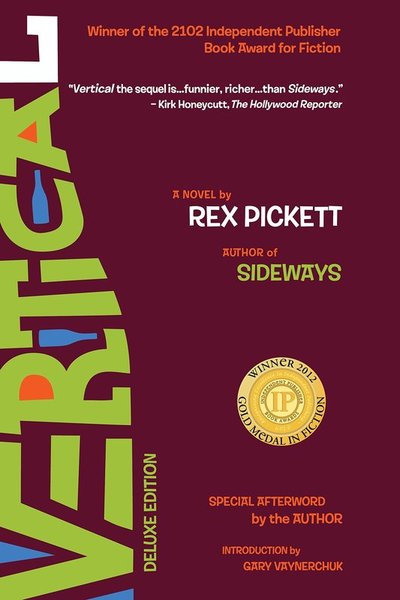 There are times in literature and film that I am amazed a sequel manages to come to life. We've all seen that one story that quite frankly, reached its logical conclusion. Yet a year or two later somehow someone manages to figure out how to take us on a journey with familiar characters one more time. While it may seem like I'm about to complain about such a move, I'm not. ranted, there are times sequels disappoint each and every one of us, but truly sequels mirror life in a way. or our greatest moments and our darkest hours don't fade to black and end there. There is usually more to our own story, so it makes sense that in the creative field writer's eventually figure out how to take us to the day after. Case in point, today's review of the sequel to Rex Pickett's Sideways...Vertical. Oh how the times have changed. Once a down on his luck writer, Miles has found success at last by turning the week he spent with Jack in wine country into an incredible best selling novel. But while he tastes the good life at last, the times have not been so kind to Jack, who finds himself in between acting gigs more often than he would like, and divorced. But a desperate request from his mother will bring back the good old days as Jack and Miles reunite for a road trip into wine country once again. To say that I was excited to read Vertical after powering through Sideways would be an understatement. To reunite with these vivid characters was a complete and utter joy and after being unable to put the first book down, I knew deep down that the sequel would not disappoint and I was absolutely right. Vertical wastes no time drawing you back into the upside down world of Miles and Jack and while there was potential for a complete re-telling of the first book, Rex Pickett surprises again by growing these characters into the next phase of their lives. The beauty of this series is that Miles and Jack are dynamic and grow and change like the rest of us do. It continues to allow us to relate to the two of them because of how they simply jump off the page. But what caught me off guard this time around was the fact that Vertical is a darker novel than I expected it to be. While its predecessor had its heavy themes, the sequel digs deeper, taking us on a journey into the parts of life that we all never want to face. I don't want to go into too much detail as to what incredible events go down in the book since I want you all to read it and experience it first hand, but this book and its ending in particular moved me to tears. It was simply that beautiful. This is, hands down a magnificent read and I encourage all of you to pick it up as soon as possible. In fact, Vertical left me wanting more and the good news is that Rex took the time to write a grand finale and it is as magnificent as this book and its predecessor and I'm glad I was able to go back and enjoy the series as a whole and appreciate the fact that this book, is a wonderful Act 2 for Miles, since it serves as his darkest hour as he searches for a beautiful Pinot Noir filled dawn... Written by John Edward Betancourt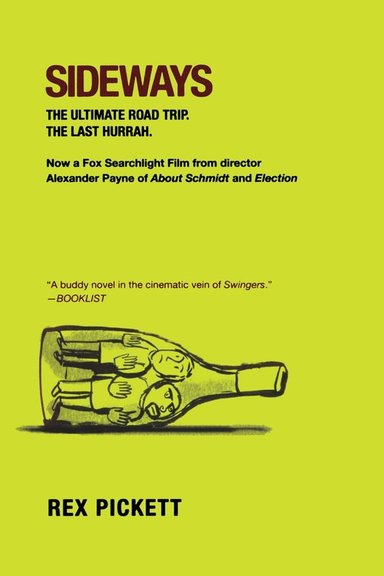 Ah the road trip. We've all been there. The open road before us, the wind whipping about the car with only good tunes and good company at our side. In my family, the road trip was a semiannual tradition. We'd pack up the old station wagon and trek out toward Phoenix to see my extended family. For many years I enjoyed these little trips, but as the years progressed, it was all that quiet down time between destinations while I was trapped in the backseat with my siblings that began to force me to re think the value of the road trip. In fact, as the years have progressed, I have made great effort to avoid them at all costs. Yet as the wonders of stories are wont to do, I have started to question that logic, courtesy of author Rex Pickett and his novel...Sideways. Sideways is the story of two best friends/drinking buddies, Miles and Jack. Miles is a struggling author and Jack is a working actor in Hollywood. But Jack's days of being a single man are coming to an end as he prepares to marry the love of his life, prompting Miles to take him into the heart of wine country for one last road trip as bachelors. While the plot sounds simple and cozy, it is anything but. Sideways is a fascinating and hilarious book, as since the road trip these two men embark upon ends up becoming so much more. We learn quite a bit about Miles and Jack and in many ways these two men turn out to be anti-heroes in every sense of the word and that's where the book grabs hold of you by providing such vivid characters. These two men are incredibly flawed, and you will quickly discover you want to learn more about them and who they are. You'll spend plenty of time wondering why Jack questions the sanctity of marriage and you'll think him a scoundrel for his actions when all is said and done. But Miles is the true centerpiece of this story. He is a man filled with demons that torment him daily and he is doing his best to find that slice of happiness in either his work as an author or in life with someone he can finally love. His internal torment drives him to do desperate and questionable things, in fact both characters will force you to raise your eyebrows on more than one occasion but that's the beauty of this tale. We can relate to these guys. They may be amplified in their actions for the sake of the story, but who among us hasn’t felt as lost in life as Miles? Or who hasn’t been afraid of truly opening ourselves up to those we love just like Jack? Yet another wonder of this book is the fact that it balances the bitter with the funny. There are many times you'll find yourself laughing out loud at the crazy situations that these two goofballs get themselves into and the book is famous for its incredible detail when it comes to wine. But what I loved most about this story was that it brought back the wonder of the road trip for me. That moment when we finally see the city in our rearview mirror only to be replaced with the open road and the wonder of tomorrow, where we are free of worry and the burdens of the world...if only for a little while. Written by Scott Murray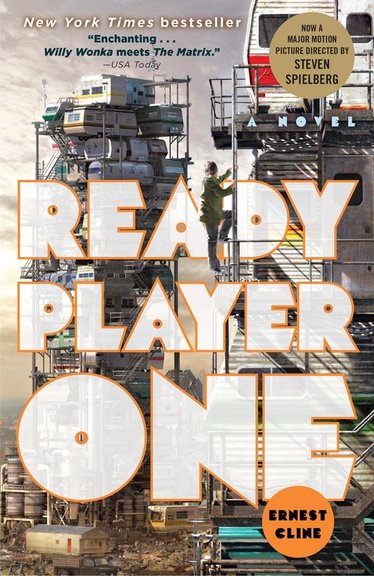 Ready Player One is an extremely fun and entertaining book. If you enjoy sci-fi and have paid any attention to it or its surrounding culture, or to nerdery or geekdom in general, or have found yourself wanting to learn more about them, you should absolutely give Ready Player One a read. It’s fantastic, and I’m sure you’ll enjoy it. I preface my writing with this statement because the more I find myself breaking the book down the more I find unsettling uncertainties. Despite these, I enjoyed reading the book immensely and would gladly recommend it to almost anybody. In fact, I read through it in less than two days in an effort to finish before the film’s release, and despite my breakneck pace it never once felt like a chore that I had to return to in order to satisfy some looming deadline. It was actually quite the opposite: I found myself tempted to pick it up even when I was doing other things. This is why it feels awfully strange to sit down and write this: most of the quantifiable things I have to say are tinged with disappointment or unease, but, like a visit to Disneyland, even when I saw the employee in the costume, I had fun anyway. It would be easy to read this and feel that I walked away from Ready Player One feeling disgruntled, but that simply isn’t true. I thoroughly enjoyed reading this book, but I’m afraid my following words will seem to indicate the opposite, despite my best efforts, simply because the good I feel is difficult to put into words, while the niggling concerns I have are easily identifiable. Let me start the meat of my examination by putting some fears to rest: if you think you won’t understand the many terms or technologies jam-packed into this book, worry not: Cline gives deft, accurate, and easily-digestible explanations about almost everything he mentions. For the things I was not familiar with the explanations were clear, easy to understand, and helped bring me into the fold without making me feel overwhelmed with information or like I was being given a shortened or watered-down experience. The explanations of things I am already intimately familiar with were nice refreshers, concise enough that they never once felt like a chore to read and served to highlight which parts of my experiences or knowledge would be pertinent. Even if you know nothing about technology or any of the themes of the book, you should be able to follow along with no hesitation or confusion. And oh boy, if you’re looking for references, you’ll find them in spades. Some are overt and obvious, dancing in front of your face like the giant advertisements that litter the skyline in Blade Runner, while some are more subtle, secreted away in a few syllables of casual, off-hand sentences. They run the spectrum: there are sections where things are explained thoroughly, parts where they’re mentioned only in passing, segments where they are so subtle you’re not sure they were really there, and meaty laundry-lists of authors, film series, music, and TV shows. Unfortunately, the overall effect left me wondering about Cline’s exact intentions and experiences. There are so many things named in certain sections of the book that it almost feels like he must have looked up a list just to cram in a greater number of recognizable words. There are other sections where a given film or comic is slipped so deftly into the conversation and in such detail that it feels like Cline must talk about them in casual conversation, chatting about them as easily as breathing, and much more willingly. Still other times certain properties are mentioned, described, or hinted at before they simply vanish, never to be plot-relevant or even mentioned again, while still other things are mentioned with so little fanfare they might be easily missed as not being references at all. It’s hard to tell which pieces of nerd culture were included because they were Cline’s favorites, which were included because they were famous or influential, and which were included simply as an attempt to capture as expansive a sample of the wide unending ocean of pop culture as possible. Similarly, it left me wondering about the author’s exclusions: were some authors, games, or creators not mentioned because Cline was not a personal fan of theirs? Because they were not well-known enough? Because they wouldn’t feature in the plot? Or simply because there wasn’t space to stuff them into the book without making it far too long to read; an endless series of lists of names and works? I simply wasn’t always sure what was a reference and what wasn’t, and so I was left to examine each strange phrase or unusual term with suspicion, wondering whether it was an innocent sentence or another reference I wasn’t getting. I think my confusion about this matter is best exemplified with other books: at the beginning of Ready Player One, in a list of important authors, sci-fi and cyberpunk pioneer William Gibson is absent. This was not odd in itself, since there are just so many important authors that many influential and important ones would surely be left out. However, pieces of Gibson’s influence were felt throughout the book, and terms that he coined which later entered the wider public and specialized vernaculars are dotted throughout it. It left me wondering if Cline was even aware of the influence Gibson has had, both on science fiction and certainly on Cline’s own book. Later, when one of Gibson’s works is mentioned by name, it became obvious that Cline did indeed know about him and had made his references intentionally. This left me wondering about Gibson’s exclusion from the list at the beginning of the book: was it done in favor of more widely known authors like Tolkien, or perhaps because Gibson is not a personal favorite of Cline’s? Maybe, as I had originally presumed, it was simply because there wasn’t enough space? My point is only that, when I caught a line or word that might have been a reference to something I recognized, I was only certain it really was an intentional reference about half the time, and I was never quite sure whether Cline knew what he’d inserted or not. Some things had attention drawn to them and were thus confirmed as intentional references with purpose, while others were never mentioned again, leaving things unclear as to whether they were intentional references or simply things that naturally tend to turn up in your lexicon if you’ve spent as much time immersing yourself in these things as Cline has. One thing is for certain: Cline knows a lot. The sheer amount of information that he holds command of is staggering. And it’s not all just bullet point facts, either. He certainly didn’t pull most of it from some list or summary. No, much of what you encounter in this book comes from the type of familiarity and mastery that only comes from a lifetime of immersion and participation as a fan of the genres. While navigating Cline’s journey you get to see, everywhere you look, bits and pieces of the things that inspired him. Since each reader will have their own repertoire of inspiration, we will not feel the same experience as the author. We can never be sure if the things we see are all the same things another reader saw, or if they are all as Cline intended. In the end, I suppose they are simply the personal ‘Easter eggs’ that we each find throughout our journey, and each reader will have their own different set of eggs to find. Despite the strange uncertainty they left me with during my reading, this makes me utterly thrilled at the prospect of discussing this book with my friends so I may catch glimpses into their personal journeys, and share my own in turn. The writing style also left me with questions. Chekhov’s Gun is loud and makes frequent appearances, with major events receiving plenty of foreshadowing. Even some smaller events or twists are plain to see a few pages before they happen. There are only a couple of foreshadowed events that do not come to pass (or, at least, I didn’t notice them,) and I can’t tell if they were an attempt to get the readers to cast doubt on all their other predictions, things I mistook for foreshadowing, completely forgotten, or simply pieces Cline felt he couldn’t add anywhere else. The book will sometimes describe past events in order to contextualize or prepare you for upcoming ones, but these usually occur soon before their relevant future event, leaving the few that are on a slow-boil easy to recall as you keep your eyes peeled for their inevitable resolution. Some seem out-of-place, inserted in the middle of some unrelated event or description, leaving you to wonder whether Cline forgot about them or had inserted them wherever he’d been writing when he looked over and saw them on his author’s notes. The jumps forward in time, on the other hand, are excellent, their skipped calendar days revealed to you in concise summaries so that we can return to the action more quickly. They perfectly exemplify the famous Hitchock-attributed quote: ‘What is drama but life with all the dull bits cut out?’ Cline deftly ushers us on when there’s nothing left to see so we may pass straight on to the next important or interesting moment. These scene jumps feel not unlike a stage play, where we see on stage only those moments crucial to the plot we are following. After all, who wants to see Hamlet relieve himself, or change into his pajamas? (Unless, of course, he’s got a good internal monologue to speak to us. Then we might tolerate such a bland physical action.) Cline’s other writing experience, especially his screenwriting, can be felt throughout the novel: there were a number of scenes involving multiple characters where two of them did almost all of the talking. While busy conversations are more easily written out on paper, they are more difficult to encompass on screen, with the added needs of presenting each speaker visually, or the added budget constraints of paying actors to speak. One or two conversations felt awkward, with characters largely ignored or eerily silent, but for the vast majority of the book Cline deftly used this method of writing to instead streamline conversations, improve their understandability, and make them easier to follow. In addition to the major events, the character arcs were also fairly standard: you could probably summarize the arc of each character after hearing their role in the story: main character, main character’s best friend, female character, villain, mysterious elder figures One and Two, etc. We do see one major exception here that surprised me: I had presumed a couple of supporting characters were going to meet suffering or death in order to be used as examples of how far the antagonists would go and to add a sense of danger to the plot, but in the end only one of them served that purpose. The other remained until the end of the book. In the end though, the characters were enticing, entertaining, and extremely well written. I can’t think of another book in recent memory where I can so vividly and decisively picture the exact body language of a character like I can with our ‘main character’s best friend,’ Aech. (pronounced like the letter ‘H’) Cline’s writing really brings the characters to life and makes them feel like real people, whether we’re reading about the avatar they’ve created for themselves inside the virtual world or the real human manipulating the controls. I finish now, looking back upon what I feared and knew would come to pass: most of my article seems awfully negative. But, in the end, I still wholeheartedly recommend this book, despite my confusions and misgivings stated above. Why, you may ask? Because, while I can easily quantify the things which irked me, I find it much more difficult to pin down exactly why I had so much fun reading this book. It enticed me to turn pages like I used to when I was little: every spare moment was spent reading this book, and whenever I was not reading it I was gripped by a burning desire to return to the world within its pages. It had fantastic action and lovable characters, took me to wonderfully detailed and fully-realized worlds, and I recaptured that sense of wonder and joy that only a few, truly engrossing books manage. Even aware of the problems I wrote about above, I still enjoyed every minute of my journey, and I don’t regret diving into this story at all. It may not be the linguistic or plot pinnacle of fiction, but books don’t have to be. Sometimes, they just have to be fun, and Ready Player One was very, very fun. I know I’ll be discussing this book and thinking about it for a very long time indeed, and always with a smile on my face. Written by John Edward Betancourt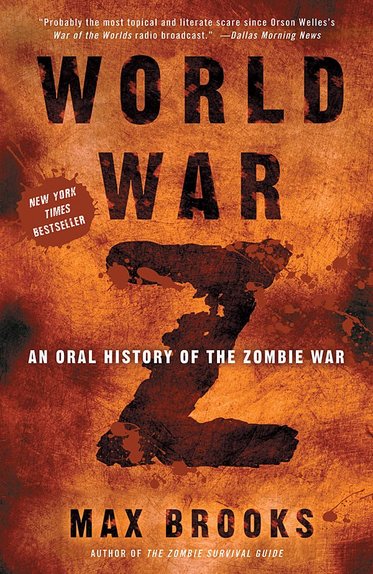 The zombie apocalypse continues to permeate all levels of entertainment. We have seen it return to film with a vengeance, the living dead invade our living rooms every Sunday night and yes, in their own special way the undead have even managed to shuffle into literature with their appearance in the 2006 best-selling novel by Max Brooks; World War Z. The world stood on the brink. Mankind faced extinction. There was panic in the streets, governments were helpless to act when the unthinkable had come to pass. The dead had returned to life and were feasting on warm human flesh. Yet during this darkest hour, as humanity faced extinction, the tide at last turned and man reclaimed the world from living death. But to ensure that man will never again face such a horrible fate, one man will reach out to learn the truth of what went so horribly wrong. I'll just get this out in the open right now, I loved this book. Yes, I know, I'm a zombie fanatic and it is exactly why I picked up this book to begin with, but the follow up to Max's first satirical zombie novel; The Zombie Survival Guide is an incredible book through and through. Filled with homages to all the great zombie stories that came before it, World War Z does an outstanding job of showing us what a pandemic of any kind might look like, and it features some fascinating reflections upon our own world since the bickering, ignorance, and profiteering that are present in this tale are things we see discussed on the nightly news the instant anything goes wrong in the world . Of course, such stupidity is amplified in a book like this, but there is a level of discomfort while reading this novel for one simple reason, it reminds you of all the bad things we've seen unfold on television in recent years. But most importantly, all real-world parallels aside, this is a downright terrifying novel as well. There are sequences, specifically the Battle of Yonkers, that evoke utter terror in the reader with Brooks' smooth writing style and realistic approach. This is definitely a must read for any horror enthusiast or book worm in general. The story is gripping, and even though you learn up front that man managed to survive this awful plague, there are times where you wonder exactly how we made it out alive. Written by John Edward BetancourtTHIS IS THE EMERGENCY SPOILER ALERT SYSTEM...YOU ARE ADVISED TO READ AT YOUR OWN RISK...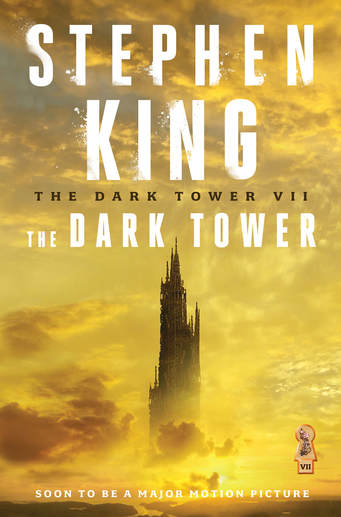 Sadly, every story that draws us in and that we love so much, has to come to its end. It's never easy knowing that fact and it makes picking up the last story in the series all that more difficult, because we know that when we reach those final pages we will no longer share in the wonder of this tale and its characters, we simply say goodbye. That was the case as I picked up the final chapter in Stephen King's magnum opus. I knew full well this would be a final farewell, and yes while The Wind Through the Keyhole came out after this book, that doesn't matter, this is where Roland and his ka-tet met their destiny, this was the book filled with heartbreak, this...was the end with The Dark Tower VII: The Dark Tower. Mordred Deschain has been born and is simply an abomination. This shape shifting creature has only one thing on its mind, to find its father, Roland and kill him. Thankfully, it need not look far, for Roland and his ka-tet have reached End World and they will have far worse than Mordred to deal with as they face off against the Crimson King's lieutenants and fight a costly fight to finally reach...The Dark Tower. What makes this novel rewarding, yet difficult to get through, is that everyone's story arc comes around full circle, whether you like it or not. I say that, because this is the novel where Stephen King finally unleashes a no holds barred style of writing that ends up costing several characters their lives. I don't want to go into that too deeply if you haven't made it that far yet, but know that heartbreak is coming and you will have to say goodbye to some folks sooner than you would like. But the part that matters most about this book, is the grand finale and that we finally get the epic showdown we have been waiting for all along between Roland and the Crimson King and of course...we finally arrive at the Tower. Now I'm not spoiling anything by telling you that, because the title of the book and the cover reveal that fact as well, but it is just so glorious to finally see the Tower after years of searching for this mystical place alongside Roland...which of course leads us to the controversial ending. Those of you who have finished the book know precisely what I am talking about, and those who have not, well you're in for a grand internal debate. For there are two endings to this novel, one that simply ends the story and one that serves as the true ending. King even warns us that the real ending may not satisfy and it is one that has divided many a fan of this book. I for one, love the real ending. I think it's fitting and beautiful in its own special way. Either way, out of all of the books in the series, this one was my favorite. It is a book that I was worried about when it came to the ending, because when you have a universe this big and diverse and a story this grand to tell, the ending could certainly let you down. But man, this book simply delivers in every possible way. Sadly though, our discussion of these fine books must end as well, so I ask that you certainly give them a read, I don't think you'll be disappointed in doing so and I bid you all farewell by wishing each and every one of you...long days and pleasant nights. Written by John Edward BetancourtTHIS IS THE EMERGENCY SPOILER ALERT SYSTEM...YOU ARE ADVISED TO READ AT YOUR OWN RISK...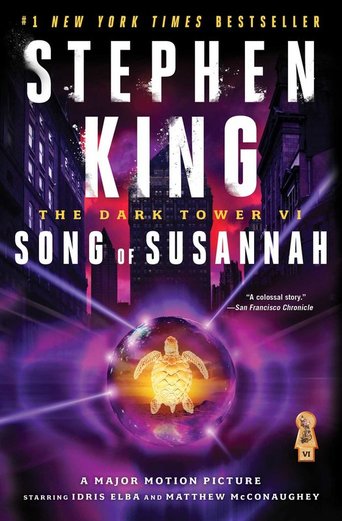 I have always loved the type of story where everything is on the line. Where the stakes are high and the characters are forced to give their absolute best. As a reader, it gives you two incredible things. For one, it leaves you firmly glued to the story, where you simply have to know what happens next. Past that, it completely draws you in. You are in that world, and your heart beats in line with the characters. It is those kinds of stories where you put the book down once you have reached the end and take a deep breath, because you have returned to the safety of reality, yet at the same time you realize that have gone through a once in a lifetime experience. It is that kind of writing and storytelling that one finds when they pick up the sixth chapter in The Dark Tower series, Song of Susannah. Following the events of Wolves of the Calla the demon named Mia has taken control of Susannah and takes her body through the doorway, arriving on the Earth we call home in 1999. Here she reveals that the baby within her is the son of Roland, since the same demon that Susannah seduced, also seduced Roland in another time and place. This child serves great purpose to the Crimson King, the current ruler of the Tower, and through a deal with the Man in Black, she will be allowed to raise the child. As Susannah/Mia waits for this abomination to arrive, the ka-tet goes through the doorway as well and are sent to our world, but are split up into different time frames. Father Callahan and Jake arrive in 1999 and Roland and Eddie arrive in 1977. Both groups are on a specific mission. Callahan and Jake are preparing to deal with the mess involving Susannah/Mia, while Roland and Eddie work to save the rose in New York and along the way meet a writer named Stephen King whose story about a distant Tower may be instrumental to finishing their own quest. So, when this book first came out, there was immediate question as to how Stephen King would make a cameo in his own work and well the whole notion seemed pretty meta until I picked up the book. It turns out King's ‘role’ in the book is actually quite integral to the story, specifically the parts as to where he debated not finishing The Dark Tower story and how he proves to be more of a vessel for the tale rather than an architect. After all, there was worry from us fans that the story would never be complete as is and well...by making himself a pawn of the Tower in no way draws the attention to him. If anything, it continues to build the powerful story that manages to weave together all of King's work. But, that aside, this book clearly is the setup for the grand finale, and it is packed to the gills with tense moments and for the first time ever there is a powerful sense of urgency to the story. Every page builds incredible tension as the stakes continue to get higher and you start to feel real danger for the characters and that happens to draw you in further. In fact, this one did such a great job of drawing me in that I finished it in three days and like the other books in the series, I've re-read it countless times. Either way, some may not enjoy the fact that this book is about so much setup, but it's all necessary. The whole plot piece of baby Mordred Deschain preparing to be born is fascinating to say the least and I like the fact that the book leaves us on a cliffhanger. It makes the danger all the more real and makes the final entry in the series worth the wait. Written by John Edward BetancourtTHIS IS THE EMERGENCY SPOILER ALERT SYSTEM...YOU ARE ADVISED TO READ AT YOUR OWN RISK...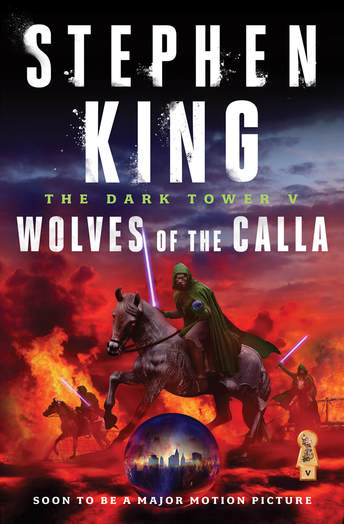 There comes a point in the story where we realize we are in for a treat. We know that our heroes and heroines have reached a point of no return, where their fates will be decided in incredible fashion and often times, great things will come from this. They will save the day and we will love every minute of it. Yet at the same time these moments also signal the beginning of the end, for as the battle becomes greater and the stakes are raised we know that the end of the journey awaits us as well and it is that kind of bittersweet storytelling that comes forth in the fifth chapter of The Dark Tower series, Wolves of the Calla. Roland and his ka-tet have had a long journey after the events of Wizard and Glass and find themselves nearing End World, where The Dark Tower awaits. But before they cross into this horrible wasteland, they reach the farming community of Calla Bryn Sturgis, where the group is asked to help in saving the children here from a horrible fate. For once a generation ‘wolves’ come from End World to steal the children of the town only to return them as shells of their former selves. The ka-tet agrees to help but as they prepare for the battle, they meet a priest from another reality and the device that brought him here reveals that there is something beautiful in another world and another time that Roland must protect, a single red rose. As if the stakes aren't high enough, there is also another threat growing within the group...a baby inside Susannah that comes from the demon she seduced in The Waste Lands to help Jake come into their world is gestating and it has awakened a nefarious personality within her named Mia that may bring doom to them all. To say that this story isn't loaded to the gills with action and excitement would be an understatement because holy cow does Wolves of the Calla impress through and through. Finally, we get to see what Roland and his ka-tet can do, all while setting up the grand finale for this story in amazing fashion while adding a new wrinkle to the fold that initially caught me off guard...the introduction of Father Callahan from Salem's Lot. Yes, for the second time in the series, another character from the King-verse manages to appear with quite the big role to say the least. It is this plot twist that reinforces the importance of Roland’s world and of the Tower, and when you throw Stephen King’s incredibly vast story universe into the mix as well, it raises the stakes for the forthcoming finale, since the true gravity of the Tower’s salvation isn’t properly realized until this particular novel. Because it is in this story, that it becomes inherently clear just how many realities the Tower actually holds together and now the lives of so many hang in the balance. This is however, another transitional book in the series, meant to set up the final two. Yet once again one cannot put it down, because the introduction of Mia and the consequences of Susannah's sexual sacrifice all leave you hooked for the next chapter of the story and while it ends on an ominous note you are still left with a sense of hope. For now that you have seen what Roland and his ka-tet can do in battle, you know they will do incredible things to save both the day...and the universe. |
Archives
September 2024
|
|
© 2012-2025, Nerds That Geek LLC.
All Rights Reserved. |
uWeb Hosting by FatCow

 RSS Feed
RSS Feed